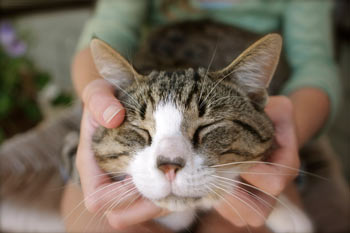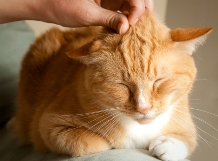Why Do Cats Purr? The How & Why of Cat Purring

If you've shared your home with cats, you may have been lucky enough to have one climb on your lap or cuddle next to you and make a delightful rumbling sound. Cats' purrs are among the many reasons we love them.
When Do Cats Start Purring?
Kittens emit their first purr when they are a few days old, and then they purr for the rest their lives, when the appropriate circumstances arise.
Purrsonalities
Each cat has a distinctive purr. Some cats have a faint, demure purr; others purr so loudly you can hear them in the next room. In addition, some cats purr at the drop of a hat, while others are quite selective with their purring.
Are There Physical Limitations to When a Cat Can Purr?
Cats can purr when inhaling or exhaling—even when eating, which is impressive. Author Jeffrey Moussaieff Masson, in his book The Nine Emotional Lives of Cats, makes the interesting observation that cats never seem to purr when they're dreaming. Perhaps a certain amount of wakefulness and control is required to purr.
Do Big Cats Purr?
Big cats that do not roar, such as mountain lions and ocelots, are known to purr. There are even some reports of leopards purring. But it's probably fair to say that little felis catus, the domestic cat or house cat, is the purring champion of the world.
Partial List of Specific Reasons Why Cats Purr
Most of us know that cats can purr up a storm when they're utterly relaxed and being stroked by a favorite human. In these instances they clearly seem to be expressing pleasure and closeness—a general bliss. But there are other times when cats purr, including:
- In scary, vulnerable situations. Often this equates to a vet appointment.
- When ill or in pain, probably to comfort themselves but quite likely also to say "comfort me" if they know someone is listening.
- When in labor.
- Kittens and mom often purr when nursing, probably to communicate to each other that everything's all right, and probably also because from contentment.
- Sometimes a cat will purr as a sign of non-aggression when encountering a new cat; cats probably understand that a cat they meet is unlikely to attack while purring.
There are undoubtedly other reasons for cats to purr that we haven't discovered yet. Purring can express a range of emotions from sheer joy to gentle affection to fear and distress. Usually we can tell by context whether a purr is expressing profound pleasure or stress. Purrs that represent in-between states may be a little harder to read, especially in an unfamiliar cat. In general, when interpreting cat signals, it's a good idea to consider circumstances and the cat's history and habits (if known) and to pay attention to the cat's body language and overall demeanor in addition to vocalizations and sounds. The meaning of a cat "communiqué" may depend on all of these factors.
To What Degree Is Purring Directed at Humans?
In most households with multiple cats, the majority of the purring seems to be directed at humans rather than other cats. Perhaps, with our inferior sense of smell and greater reliance on audio cues, we're more attuned to vocal communications—and cats realize this. Most meows in households with cats are also intended for a human audience.
Elizabeth Marshall Thomas, best-selling author of books about both cats and dogs, notes that her cat purrs extra loudly for her husband, who's hard of hearing. Cats may modify their purrs on an individual basis; you could get your own custom purr.
Cats Sometimes Use Purrs to Manipulate Their Humans
Cats are certainly resourceful. A recent study shows that cats know how to make their purrs sound more compelling if that leads to their humans being more attentive to their needs (Karen McCombemail, 2009). The lead researcher of the study wondered how her own cat seemed to generate extra-compelling purrs at times. So she asked volunteers to record their cats' purrs at home in various situations. A follow-up analysis of the recordings, and humans' reactions to them, revealed that housecats—especially those with close relationships to their humans—often put a subtle "spin" on their "wake up, it's time to feed me" purr that makes their humans more motivated to comply with the cats' requests.
What's the cats' trick? Embedded in every purr is a low-level, high-frequency sound that is reminiscent of a cry or meow. Humans respond sympathetically to this sound. The study showed that cats can exaggerate this almost-hidden aspect of purring at will, and do so when they find it useful.

Purring as Healing
Research and clinical experience show that sounds with the same frequency as purring can help repair bones and reduce inflammation. Thus, purring may facilitate physical healing.
Purring is also associated with the release of endorphins, natural pain-killers that exist in the brains of humans, cats, and many other species, and which flow when we're ecstatic and when we're in despair; this may help explain why cats purr in both good times and bad.
Perhaps the purr has other, more holistic healing qualities. It's easy to get lost in the lull of the purr. In that sense, it's like the mantra which is used during meditation. When listening to a steady purr is combined with friendly touch and a rewarding feeling of companionship, gentle interaction with a cat can be powerful therapy. One's blood pressure—and cares—are likely to ebb in the company of a happily-purring cat.
Purring to Help Others
There are countless reports of cats coming over to ailing humans and purring for them, sometimes for extended periods of time. In addition, there are many touching accounts of cats maintaining purring vigils for fellow companion animals, including dogs and rabbits, which are in ill health or dire straits. When dispensing therapeutic purrs to their "patients," cats usually snuggle next to them as well, heightening the effect.
Cats may have a reputation for being aloof, but these experiences (among many others) show that cats not only possess deep empathy but also act on that empathy to make a positive difference.
A Historical Curiosity
Oddly, although the Egyptians revered cats, there is no Egyptian word for "purr." There is also no ancient Latin or Roman word for "purr." Surely cats had occasion to purr for humans back then.
However, there is an Old English reference to purring which implies that, even centuries ago, people saw purring as a quintessential cat behavior:
The cat amid the ashes purr'd
For purrs to cats belong.
How Do Cats Purr?
Recognizing that purring is such an innate, useful, and diverse means of expression for cats leads us to ask, "How do they do it?" What is the physical mechanism that produces the purr sound? No one knows for sure. Explanations come and go. The current leading theory is that cats generate the magnificent sound by coordinated contractions of the larynx and diaphragm. The larynx is the voice box and the diaphragm is the main muscle used for breathing. Twenty-five to 50 times per second (in some cats, up to 150 times per second) the larynx muscles cause the vocal chords to separate, and the diaphragm pushes air through the cat's airways and through the space between the vocal chords, causing that audible vibration we love so much.
But we're still learning about the physical causes of purring; surely there are still aspects of this phenomenon that are beyond our knowledge. Carolyn McDaniel, a veterinarian at the Cornell Feline Health Center, admits—humbly—that "We can do an MRI on a cat, treat its cancer with chemotherapy, control its asthma with inhalant therapy, but we can't explain its purring mechanism." Perhaps some things are better left a mystery.
Enjoy the Mystery
One thing about which we are fairly certain is that purring is not an involuntary reflex; cats purr intentionally (or on purrpose). Therefore, when your friendly fluffy fur ball climbs on your lap and starts that magical, mystical rumbling sound, you should feel honored—or charmed.
Works Cited:
- Karen McCombemail, A. M. (2009, July 14). The Cry Embedded Within the Purr. Retrieved from Current Biology: DOI: 10.1016/j.cub.2009.05.033: http://www.cell.com/current-biology/abstract/S0960-9822(09)01168-3
You May Also Like These Articles:
Why Do Cats Do the Slow Eye Blink? : It's a Kitty "Eye Love You"!
How Can You Tell If Your Cat Loves You?
What Is a Group of Cats Called?
Why Does My Neutered Cat Hump Things?





